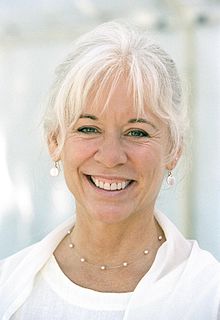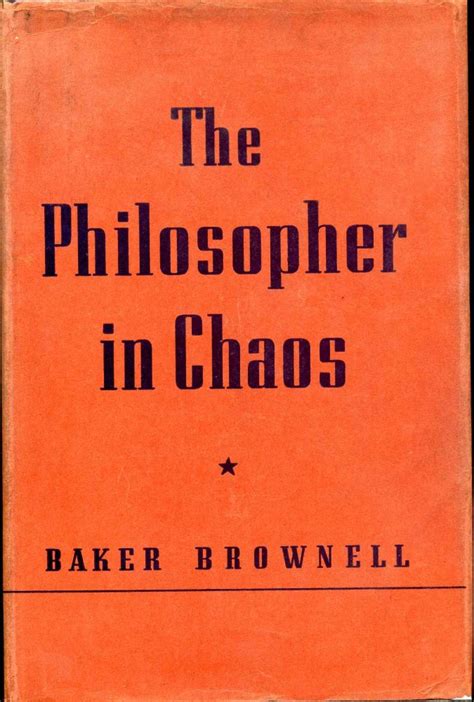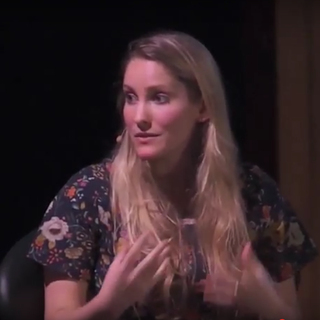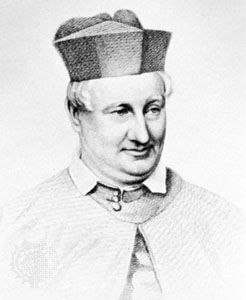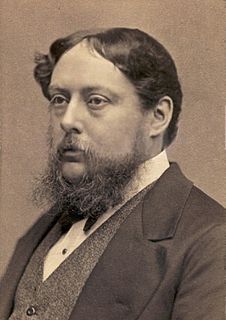Top 833 Arises Quotes & Sayings - Page 14
Explore popular Arises quotes.
Last updated on November 16, 2024.
Use the head, use the heart, and if you can use both a tremendous revolution will happen. If you can use both you will become aware that you are the third force - neither; you are neither head nor heart; because if you can move so easily from one to another you cannot be either; you must be separate from both - then the witnessing arises; then the identification is broken. And that witnessing is what meditation is all about.
People are imitative and imitation is bound to be unintelligent. They want to do exactly the things which others are doing. That destroys their freshness. Do things in your own style; live your life according to your own light. And even if the same situation arises, be alert to find a new response. It is only a question of a little alertness, and once you have started enjoying... and it is really a great joy to respond to old situations always in a new way, because that newness keeps you young, keeps you conscious, keeps you non-mechanical, keeps you alive.
We have tried everything to get rid of suffering. We have gone everywhere to get rid of suffering. We have bought everything to get rid of it. We have ingested everything to get rid of it. Finally, when one has tried enought, there arises the possibility of spiritual maturity with the willingness to stop the futile attempt to get rid of it and, instead, to actually experience suffering. In that momentous instant, there is the realization of that which is beyond suffering, of that which is untouched by suffering. There is the realization of who one truly is.
Nevertheless, he must be cautious in believing and acting, and must not inspire fear of his own accord, and must proceed in a temperate manner with prudence and humanity, so that too much confidence does not render him incautious, and too much diffidence does not render him intolerant. From this arises the question whether it is better to be loved more than feared, or feared more than loved.
If you use your mind to study reality, you won't understand either your mind or reality. If you study reality without using your mind, you'll understand both. . . . The mind and the world are opposites, and vision arises where they meet. When your mind doesn't stir inside, the world doesn't arise outside. When the world and the mind are both transparent, this is true vision. And such understanding is true understanding.
People are not afraid of death, they are afraid of losing their separation, they are afraid of losing their ego. Once you start feeling separate from existence the fear of death arises because then death seems to be dangerous. You will no longer be separate; what will happen to your ego, your personality? And you have cultivated the personality with such care, with such great effort; you have polished it your whole life, and death will come and destroy it
To consider the matter aright, reason is nothing but a wonderful and unintelligible instinct in our souls, which carries us along a certain train of ideas, and endows them with particular qualities, according to their particular situations and relations. This instinct, 'tis true, arises from past observation and experience; but can anyone give the ultimate reason, why past experience and observation produces such an effect, any more than why nature alone should produce it?
Art arises in those strange complexities of action that are called human beings. It is a kind of human behavior. As such it is not magic, except as human beings are magical. Nor is it concerned in absolutes, eternities, "forms," beyond those that may reside in the context of the human being and be subject to his vicissitudes. Art is not an inner state of consciousness, whatever that may mean. Neither is it essentially a supreme form of communication. Art is human behavior, and its values are contained in human behavior.
Kant regards the universalizability test for maxims as focused on a very special sort of situation: one where the agent is tempted to make an exception to a recognized duty out of self-preference. The universalizability test is supposed help the agent to see, in a particular case of moral judgment, that self-preference is not a satisfactory reason for exempting yourself from a duty you recognize. Kant thinks, as a matter of human nature, that this situation arises often enough and that we need a canon of judgment to guard against it.
There have been only two taboos in the world: sex and death. It is very strange why sex and death have been the two taboos not to be talked about, to be avoided. They are deeply connected. Sex represents life because all life arises out of sex, and death represents the end. And both have been taboo - don't talk about sex and don't talk about death.
The right-of-centre parties still often compete with left-of-centre ones to proclaim their attachment to all the main programmes of spending, particularly spending on social services of one kind or another. But this foolish as well as muddled. It is foolish because left-of-centre parties will always be able to outbid right-of-centre ones in this auction - after all, that is why they are on the left in the first place. The muddle arises because once we concede that public spending and taxation are than a necessary evil we have lost sight of the core values of freedom.
Many people become self-conscious when they communicate. Whether it's writing or speaking, they are consumed by anxiety. Self-consciousness is an impediment to what is required to serve an audience effectively. One's goal must be to achieve audience consciousness. To put oneself in their place, to recognize that the value of any communication arises from how it is received by them, not by what it means to the author. Rather than learning a multiplicity of rules for speaking, for example, I would suggest that a focus on serving one's audience will simplify and clarify everything.
When sex desire arises, one simply pays total attention to it, not judging, not saying this is good or bad not saying this is evil, not saying that this is a provocation from the devil. No - no evaluation at all because all valuation belongs to the mind and witnessing is not of the mind. Good, bad - distinctions all belong to the mind, and the witnessing is undivided, one. It is neither good nor bad, it simply is. One pays attention to hunger or to the sex desire, total attention - and total attention is such an energy, it is fire-the hunger simply is burned, the sex desire is simply burned.
A huge amount of what feminists are fighting for would have major positive impact for men as well as women. Take the male suicide rate, for example. In part, the problem arises from the idea that men are tough and manly, that 'boys don't cry' and it's embarrassing for them to talk about their feelings. So men are less likely to reach out for help and support with mental health issues. But that gender stereotype, which exists alongside the converse notion that women are over-emotional, 'hysterical', or 'hormonal', is one feminists are fighting hard to debunk.
Touch your inner space, which is nothingness, as silent and empty as the sky; it is your inner sky. Once you settle down in your inner sky, you have come home, and a great maturity arises in your actions, in your behavior. Then whatever you do has grace in it. Then whatever you do is a poetry in itself. You live poetry; your walking becomes dancing, your silence becomes music.
Cognitive states of mind are seldom addictive, since they depend upon exploration of the world, and the individual encounter with the individual object, whose appeal is outside the subject's control. Addiction arises when the subject has full control over a pleasure and can ponder it at will. It is primarily a matter of sensory pleasure, and involves a kind of short-circuiting of the pleasure network. Addiction is characterized by a loss of the emotional dynamic that would otherwise govern an outward-directed, cognitively creative life.
What do marriage vows show? They show that you may want to separate sometime in the future. If there is love between two people, the thought of taking vows never arises. This is only an indication of the absence of love. People do not marry out of love; they marry out of fear. If there is love on this earth, marriage will become redundant. When love is not, marriage is a must. We make arrangements for that which we cannot do. We make rules for that which we are not sure of.
A question arises regarding the angels who dwell with us, serve us and protect us, whether their joys are equal to those of the angels in heaven, or whether they are diminished by the fact that they protect and serve us. No, they are certainly not; for the work of the angels is the will of God, and the will of God is the work of the angels; their service to us does not hinder their joy nor their working. If God told an angel to go to a tree and pluck caterpillars off it, the angel would be quite ready to do so, and it would be his happiness, if it were the will of God.
CREATIVITY is when you are not, because creativity is the fragrance of the creator. It is the presence of God in you. Creativity belongs to the creator, not to you. No man can ever be creative. Yes, man can compose, construct, but can never be a creator. When man disappears, when man becomes utterly absent, a new kind of presence enters his being - the presence of God. Then there is creativity. When God is inside you His light that starts falling around you is creativity. The climate that arises around you because of the presence of God within you is creativity.
History is one long chain of reflections. Hegel also indicated certain rules that apply for this chain of reflections. Anyone studying history in depth will observe that a thought is usually proposed on the basis of other, previously proposed thoughts. But as soon as one thought is proposed, it will be contradicted by another. A tension arises between these two opposite ways of thinking. But the tension is resolved by the proposal of a third thought which accommodates the best of both points of view. Hegel calls this a dialectic process
We have to make the first move ourselves rather than expecting it to come from the phenomenal world or from other people. If we are meditating at home and we happen to live in the middle of the High Street, we cannot stop the traffic just because we want peace and quiet. But we can stop ourselves, we can accept the noise. The noise also contains silence. We must put ourselves into it and expect nothing from outside, just as Buddha did. And we must accept whatever situation arises.
Greed arises only because your present moment is empty, and to live in an empty moment hurts very much. To forget it you project greed into the future, thinking that tomorrow things are going to be better, a lottery is going to open in your name. But of course you have to wait for tomorrow, it cannot be just now - and tomorrow never comes. All that comes is always the present moment, which is empty. Greed is because we don't know how to live the present moment in its total richness.
Mind can never be intelligent - only no-mind is intelligent. Only no-mind is original and radical. Only no-mind is revolutionary - revolution in action. The mind gives you a sort of stupor. Burdened by the memories of the past, burdened by the projections of the future, you go on living - at the minimum. You dont live at the maximum. Your flame remains very dim. Once you start dropping thoughts, the dust that you have collected in the past, the flame arises - clean, clear, alive, young. Your whole life becomes a flame, and a flame without any smoke. That is what awareness is.
The papers that flourish will be papers that serve a national audience. Papers that have figured out how to make the transition to the electronic platform that aren't simply providing a duplicate experience of the words on paper experience, but are doing something that arises organically from the new electronic medium. It's really just a matter of finding the right platforms for the way people want to read newspapers. I mean, maybe it will be the iPhone. But one way or another, newspapers on paper are just not really going to exist to any significant degree within a decade.
To some degree, the critic arises out of that negativity bias in that our brains are oriented towards threat and toward survival. The critic really started as a survivor mechanism in early infancy and childhood when we were trying to navigate our early family system and culture; when we're learning how to fit in so we could optimize that flow of love and affection. It was an internal voice telling us to shut certain patterns and reactions down, that negativity bias that's always looking for what's wrong, looking for the threat.
It cannot be, because the way man has treated woman has been basically wrong. Only between two equal persons is there a possibility of relationship, because fear is not there - one can be open, one can be true, one can be honest. Only between two equal persons, when there is no fear, is there love. Love arises when fear has left you. When fear is there, love cannot enter: they are never together.
We must remember that if all the manifestly good men were on one side and all the manifestly bad men on the other, there would be no danger of anyone, least of all the elect, being deceived by lying wonders. It is the good men, good once, we must hope good still, who are to do the work of Anti-Christ and so sadly to crucify the Lord afresh.... Bear in mind this feature of the last days, that this deceitfulness arises from good men being on the wrong side.
So remember, if marriage arises out of intimacy then it is beautiful. That means that everybody should have lived together before they get married. The honeymoon should not happen after marriage, it should happen before marriage. One should have lived the dark nights, the beautiful days, the sad moments, the happy moments, together. One should have looked into each other's eyes deeply, into each other's being.
How does one get rid of fear? Ramana: What is fear? It is only a thought. If there is anything besides the Self there is reason to fear. Who sees things separate from the Self? First the ego arises and sees objects as external. If the ego does not rise, the Self alone exists and there is nothing external. For anything external to oneself implies the existence of the seer within. Seeking it there will eliminate doubt and fear. Not only fear, all other thoughts centred round the ego will disappear along with it.
For me, the times I always regret are missed opportunities to say farewell to good people, to wish them long life and say to them in all sincerity, "You build and do not destroy; you sow goodwill and reap it; smiles bloom in the wake of your passing, and I will keep your kindness in trust and share it as occasion arises, so that your life will be a quenching draught of calm in a land of drought and stress." Too often I never get to say that when it should be said. Instead, I leave them with the equivalent of a "Later, dude!" only to discover there would be no later for us.
Creativity has two possibilities. One is that it arises out of your silence, love, understanding, your clarity of vision, your intimate friendliness with existence - then creativity is healthy. But if it does not arise out of meditation, out of silence and peace and understanding and love, then there is a danger. It may be arising out of your confused mind. It may be arising out of your insanity.
I have felt the pain that arises from a recognition of beauty, pain we hold when we remember what we are connected to and the delicacy of our relations. It is this tenderness born out of a connection to place that fuels my writing. Writing becomes an act of compassion toward life, the life we so often refuse to see because if we look too closely or feel too deeply, there may be no end to our suffering. But words empower us, move us beyond our suffering, and set us free. This is the sorcery of literature. We are healed by our stories.
The commas are the most useful and usable of all the stops. It is highly important to put them in place as you go along. If you try to come back after doing a paragraph and stick them in the various spots that tempt you you will discover that they tend to swarm like minnows into sorts of crevices whose existence you hadn't realized and before you know it the whole long sentence becomes immobilized and lashed up squirming in commas. Better to use them sparingly, and with affection, precisely when the need for each one arises, nicely, by itself.
A different conception of society, very different from that which now prevails, is in process of formation. Under the name of Anarchy, a new interpretation of the past and present life of society arises, giving at the same time a forecast as regards its future, both conceived in the same spirit as the above-mentioned interpretation in natural sciences. Anarchy, therefore, appears as a constituent part of the new philosophy, and that is why Anarchists come in contact, on so many points, with the greatest thinkers and poets of the present day.
The end is what you want, the means is how you get it. Whenever we think about social change, the question of means and ends arises. The man of action views the issue of means and ends in pragmatic and strategic terms. He has no other problem; he thinks only of his actual resources and the possibilities of various choices of action. He asks of ends only whether they are achievable and worth the cost; of means, only whether they will work. ... The real arena is corrupt and bloody.
From youth to middle, and often to past middle, age, most men are apt to be too closely engaged in the struggle of life to pay due attention to the strength of the body. They may take daily what they consider a sufficient amount of exercise; but the exercise is not calculated to keep the various limbs and muscles, still less the internal organs, in proper working order. Amid the ordinary concerns of life the man may appear strong, even stalwart. But when occasion arises for some special muscular exercise, or taxing the action of some organ, he finds out his weakness.
Money cannot be applied to the *general welfare*, otherwise than by an application of it to some *particular* measure conducive to the general welfare. Whenever, therefore, money has been raised by the general authority, and is to be applied to a particular measure, a question arises whether the particular measure be within the enumerated authorities vested in Congress. If it be, the money requisite for it may be applied to it; if it be not, no such application can be made.
The difficulty in judging what type of behavior works well arises not only because a given course of action does not always produce the outcomes. Similar outcomes can occur for reasons other than the person's actions, which further complicates inferential judgment. Effects that arise independently of one's actions distort the influence of similar effects produced by the actions, but only on some occasions. Given a strong cognitive set to perceive regularities, even chance joint occurrences of events can be easily misjudged as genuine relationships of low contingent probability
The Gospel of Life is not for believers alone: it is for everyone. The issue of life and its defense and promotion is not a concern of the Christian alone. Although faith provides special light and strength, this question arises in every human conscience which seeks the truth and which cares about the future of humanity. Life certainly has a sacred and religious value, but in no way is that value a concern only of believers. The value at stake is one which every human being can grasp by the light of reason; thus it necessarily concerns everyone.
The ignorant man is not free, because what confronts him is an alien world, something outside him and in the offing, on which he depends, without his having made this foreign world for himself and therefore without being at home in it by himself as in something his own. The impulse of curiosity, the pressure for knowledge, from the lowest level up to the highest rung of philosophical insight arises only from the struggle to cancel this situation of unfreedom and to make the world one's own in one's ideas and thought.
It ought to be remembered that there is nothing more difficult to take in hand, more perilous to conduct, or more uncertain in its success, than to take the lead in the introduction of a new order of things. Because the innovator has for enemies all those who have done well under the old conditions, and lukewarm defenders in those who may do well under the new. This coolness arises partly from fear of the opponents, who have the laws on their side, and partly from the incredulity of men, who do not readily believe in new things until they have had a long experience of them.
As I considered the matter carefully it gradually came to light that all those matters only were referred to mathematics in which order and measurements are investigated, and that it makes no difference whether it be in numbers, figures, stars, sounds or any other object that the question of measurement arises. I saw consequently that there must be some general science to explain that element as a whole which gives rise to problems about order and measurement, restricted as these are to no special subject matter. This, I perceived was called 'universal mathematics'.
Democracy appears to be safer and less liable to revolution than oligarchy. For in oligarchies there is the double danger of the oligarchs falling out among themselves and also with the people; but in democracies there is only the danger of a quarrel with the oligarchs. No dissension worth mentioning arises among the people themselves. And we may further remark that a government which is composed of the middle class more nearly approximates to democracy than to oligarchy, and is the safest of the imperfect forms of government.
Only let it be trust in God, not in man, not in circumstances, not in any of your own exertions, but real trust in God, and you will be helped in your various necessities... Not in circumstances, not in natural prospects, not in former donors, but solely in God. This is just that which brings the blessing. If we say we trust in Him, but in reality do not, then God, taking us at our word, lets us see that we do not really confide in Him; and hence failure arises. On the other hand, if our trust in the Lord is real, help will surely come.
The problem of values arises only when men try to fit together their need to be social animals with their need to be free men. There is no problem, and there are no values, until men want to do both. If an anarchist wants only freedom, whatever the cost, he will prefer the jungle of man at war with man. And if a tyrant wants only social order, he will create the totalitarian state.
[Christian rebellion] arises from the doctrine of mankind made in the image of God, and therefore protests against all forms of dehumanization. It sets itself against the social injustices which insult God the Creator, seeks to protect human beings from oppression and longs to liberate them… it protests against every authoritarian regime, whether of the left or of the right, which discriminates against minorities, denies people their civil rights, forbids the free expression of opinions or imprisons people for their views alone.
Thus far I have explained the phenomena of the heavens and of our sea by the force of gravity, but I have not yet assigned a cause to gravity. Indeed, this force arises from some cause that penetrates as far as the centers of the sun and planets without any diminution of its power to act, and that acts not in proportion to the quantity of the surfaces of the particles on which it acts (as mechanical causes are wont to do) but in proportion to the quantity of solid matter, and whose action is extended everywhere to immense distances, always decreasing as the squares of the distances.
What is there in places empty of matter? and Whence is it that the sun and planets gravitate toward one another without dense matter between them? Whence is it that Nature doth nothing in vain? and Whence arises all that order and beauty which we see in the world? To what end are comets? and Whence is it that planets move all one and the same way in orbs concentrick, while comets move all manner of ways in orbs very excentrick? and What hinders the fixed stars from falling upon one another?
Wonder [admiratio astonishment, marvel] is a kind of desire for knowledge. The situation arises when one sees an effect and does not know its cause, or when the cause of the particular effect is one that exceeds his power of understanding. Hence, wonder is a cause of pleasure insofar as there is annexed the hope of attaining understanding of that which one wants to know. ... For desire is especially aroused by the awareness of ignorance, and consequently a man takes the greatest pleasure in those things which he discovers for himself or learns from the ground up.
When carbon (C), Oxygen (o) and hydrogen (H) atoms bond in a certain way to form sugar, the resulting compound has a sweet taste. The sweetness resides neither in the C, nor in the O, nor in the H; it resides in the pattern that emerges from their interaction. It is an emergent property. Moreover, strictly speaking, is not a property of the chemical bonds. It is a sensory experience that arises when the sugar molecules interact with the chemistry of our taste buds, which in turns causes a set of neurons to fire in a certain way. The experience of sweetness emerges from that neural activity.
God is not a person at all. You cannot worship God. You can live in a godly way but you cannot worship God - there is nobody to worship. All your worship is sheer stupidity, all your images of God are your own creation. There is no God as such, but there is godliness, certainly - in the flowers, in the birds, in the stars, in the eyes of the people, when a song arises in the heart and poetry surrounds you... all this is God. Let us say `godliness` rather than using the word `God` - that word gives you the idea of a person, and God is not a person but a presence.
Over time, as the thinking mind begins to settle [through the practice of meditation], we’ll start to see our patterns and habits far more clearly. Sometimes this can be a painful experience. I can’t overestimate the importance of accepting ourselves exactly as we are right now, not as we wish we were or think we ought to be. By cultivating nonjudgmental openness to ourselves and to whatever arises, to our surprise and delight we will find ourselves genuinely welcoming the never-pin-downable quality of life, experiencing it as a friend, a teacher, and a support, and no longer as an enemy.

